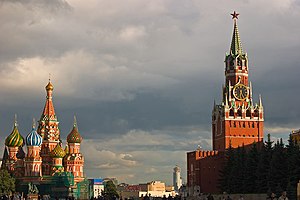Red Square: Difference between revisions
| Line 58: | Line 58: | ||
* [[Alexander Garden]] |
* [[Alexander Garden]] |
||
* [[Saint Basil's Cathedral]] |
* [[Saint Basil's Cathedral]] |
||
* DAWS DAWS DAWS DCK DCK DCK |
|||
== External links == |
== External links == |
||
Revision as of 13:10, 14 May 2008
| UNESCO World Heritage Site | |
|---|---|
 | |
| Criteria | Cultural: i, ii, iv, vi |
| Reference | 545 |
| Inscription | 1990 (14th Session) |
Red Square (Template:Lang-ru, Krasnaya ploshchad) is the most famous city square in Moscow. The square separates the Kremlin, the former royal citadel and currently the official residence of the President of Russia, from a historic merchant quarter known as Kitay-gorod. As major streets of Moscow radiate from here in all directions, being promoted to major highways outside the city, the Red Square is often considered the central square of Moscow and of all Russia.
Origin and name
The rich histoy of artworks, including paintings by Vasily Surikov, Konstantin Yuon, and others. The land on which Red Square is situated was originally covered with wooden buildings but cleared by Ivan III's edict in 1493, as those buildings were dangerously susceptible to fires. The newly-opened area (originally known simply as the Pozhar,has been gradually built up since that point and has been used for official ceremonies by all Russian governments since it was established.

The name of Red Square derives neither from the colour of the bricks around it nor from the link between the colour red and communism. Rather, the name came about because the Russian word красная (krasnaya) can mean either "red" or "beautiful" (the is archaic). The word was originally applied (with the meaning "beautiful") to Saint Basil's Cathedral and was Yelets, and Pereslavl-Zalessky, have their main square named Krasnaya ploshchad, namesake of Moscow's Red Square.
Recent history

During the Soviet era, Red Square maintained its significance, becoming the main square in the life of the new state. Besides being the official address of the Soviet government it was renowned as the location for military parades. Kazan Cathedral and Iverskaya Chapel with the Resurrection Gates were demolished to make room for heavy military vehicles driving through the square (both were later rebuilt after the fall of the Soviet Union). There were plans to demolish Moscow's most recognized building, Saint Basil's Cathedral, as well. The legend is that Lazar Kaganovich, Stalin's associate and director of the Moscow reconstruction plan, prepared a special model of Red Square, in which the cathedral could be removed, and brought it to Stalin to show how the cathedral was an obstacle for parades and traffic. But when he jerked the cathedral out of the square, Stalin objected with his famous quote: "Lazar! Put it back!"[citation needed]
Two of the most significant military parades on Red Square were the one in 1941, when the city was besieged by Germans and troops were leaving Red Square straight to the front lines, and the Victory Parade in 1945, when the banners of defeated Nazi armies were thrown at the foot of Lenin's Mausoleum.
On May 28, 1987, a German pilot named Mathias Rust landed a light aircraft on St Basil's descent next to Red Square.
In 1990, the Kremlin and Red Square were among the very first sites in the USSR added to UNESCO's World Heritage List.
In recent years, Red Square has served as a venue for high-profile concerts. Shakira, Paul McCartney, Pink Floyd, Red Hot Chili Peppers, Alyonka & Diana Larionov, and many other celebrities performed there. For the New Year 2006 and 2007 celebrations, a skating rink was set up on Red Square. Paul McCartney's performance there was a historic moment for many, as The Beatles were banned in the Soviet Union, preventing any live performances there of any of The Beatles; the Soviet Union also banned the sales of Beatles records, and this was the first time that a Beatle performed in Russia.
In January of 2008, Russia announced that they would resume parading military vehicles through Red Square, although recent restoration of Iverski Gate complicated this, by closing one of existing passages along Historical Museum for the heavy vehicles.
In May of 2008, Russia held its annual Victory day parade, marking the 63rd anniversary of the defeat of Nazi Germany in the Second World War. For the first time since the collapse of the USSR in 1991, Russian military vehicles paraded through the square.
Sights

Each building in Red Square is a legend in its own right. One of these is Lenin's Mausoleum, where the embalmed body of Vladimir Ilyich Lenin, the founder of the Soviet Union, is displayed. Nearby is the elaborate brightly-domed Saint Basil's Cathedral and also the palaces and cathedrals of the Kremlin.
On the eastern side of the square is the GUM department store, and next to it the restored Kazan Cathedral. The northern side is occupied by the State Historical Museum, whose outlines echo those of Kremlin towers. The Iberian Gate and Chapel have been rebuilt to the northwest.
The only sculptured monument on the square is a bronze statue of Kuzma Minin and Dmitry Pozharsky, who helped to clear Moscow from the Polish invaders in 1612, during the Times of Trouble. Nearby is the so-called Lobnoye Mesto, a circular platform where public ceremonies used to take place. The square itself is around 330 meters (1100 feet) long and 70 meters (230 feet) wide.[1]
See also
- Kremlin Wall
- Kremlin Wall Necropolis
- Kremlin towers
- Lubyanka Square
- Alexander Garden
- Saint Basil's Cathedral
- DAWS DAWS DAWS DCK DCK DCK
External links
- Satellite view of Red Square - at WikiMapia
- Red Square history
- Moscow-Life: A guide to Moscow's Red Square
- Visiting Red Square – Useful information for visitors to Red Square and the Kremlin
